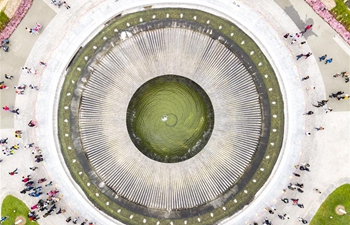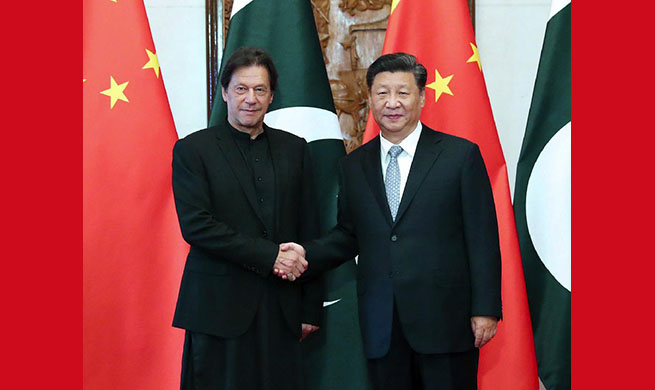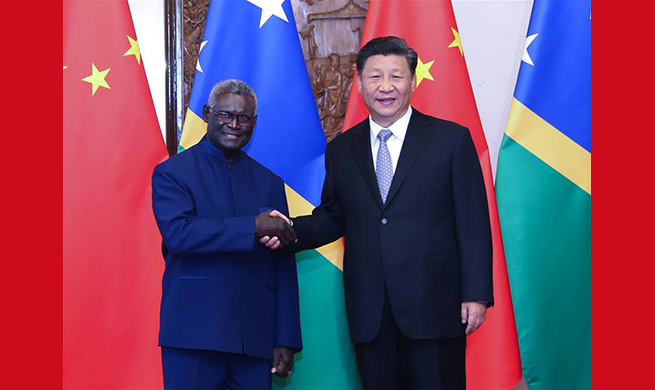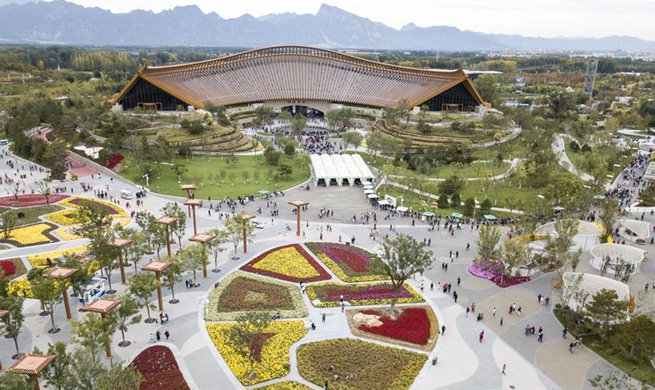by Dana Halawi
BEIRUT, Oct. 9 (Xinhua) -- Lebanese officials and local experts did not voice great optimism about Lebanon's capability of accessing funds allocated by the CEDRE, which aim at saving the country's ailing economy.
The CEDRE is an international conference which pledged to release 11 billion U.S. dollars in loans and donations for Lebanon on condition that the country makes serious reforms.
However, the country has been incapable so far of adopting reform measures required to unlock the CEDRE funds due to differences among different political parties about the 2020 state budget, which, apparently, won't be approved and implemented within the required time limit.
The 2019 state budget was approved after 37 meetings for the financial parliamentary committee, the cabinet and the parliament.
"It is highly unlikely for Lebanon to access the CEDRE funds because the Lebanese system is constitutionally incapable of engaging in serious reforms," Hilal Khashan, chair of the Political Studies Department at the American University of Beirut, told Xinhua.
Pierre Duquesne, French inter-ministerial delegate to the Mediterranean, gave an overview during his last visit to Lebanon about the reforms that need to be implemented by the government to start receiving the CEDRE funds.
Reforms include the adoption of the 2020 state budget within a specific time by conducting several measures, such as the fight against tax and customs evasion, the creation of a regulatory body for the Electricite Du Liban, the formation of a Telecommunication Regulatory Body and a board of directors for Beirut's Port.
Other reforms include an overhaul of the electricity sector which costs the government around 2 billion U.S. dollars in deficit yearly and a complete reform of the public sector which suffers from an abundance of non-functional employees.
None of these changes have happened so far.
However, Deputy Prime Minister Ghassan Hasbani seemed a bit more optimistic.
"I am optimistic that we are under pressure now which should be leading us to reforms," he told Xinhua.
But Hasbani believes that different political parties should agree to give up their privileges in a bid to implement the needed reforms at the expense of the government and not the people.
"There is concern from France and other countries who are contributing to the CEDRE about the Lebanese government's capability of paying back its loans," he said, adding this is why they are keen on seeing real reforms.
Former Economy Minister and businessman Nicolas Nahas said he did not see an organized work plan by concerned officials to formulate the needed legislations for implementing reforms.
Nahas said Lebanon may still be able to access the CEDRE funds if it accelerates reform measures and send real positive signals to the international community.
Lebanese government had a debt of 86 billion U.S. dollars by the end of July.
"Public debt ... is the third largest debt in the world. Lebanon is paying interest on this debt. The country has reached a situation where it is no longer capable of paying the interest," Khashan said.
Khashan fears that the government defaults on its loans which will necessitates a restructuring in the debt.
"Restructuring involves banks forgiving the government for a big part of the debt and restructuring the rest of the debt which will impact depositors' savings," he said.
While the country has been waiting for several needed reforms to unlock the CEDRE funds in hope to restore life to the economy and the various productive sectors, Lebanese Prime Minister Saad Hariri has been doing parallel efforts in an attempt to attract financial support to Lebanon and give more time for reforms.
Hariri attended on Monday the UAE-Lebanon Investment Conference, hoping that the United Arab Emirates (UAE) would inject cash into the country's central bank to help shore up the economy.
At the conference, Hariri called upon Emirati companies to invest in electricity, gas, roads, ports and airports in Lebanon.
Also, last month, Hariri spoke to the Saudi finance minister about support for the Lebanese economy and preparations for the first meeting of a bilateral council.
Saudi Finance Minister Mohammed Al-Jadaan announced that Riyadh was in discussions with the Lebanese government about providing financial support.
Moreover, Finance Minister Ali Hassan Khalil announced last month that Lebanon intends to issue 2 billion dollars in Eurobonds to pay this year's debt obligations.

















